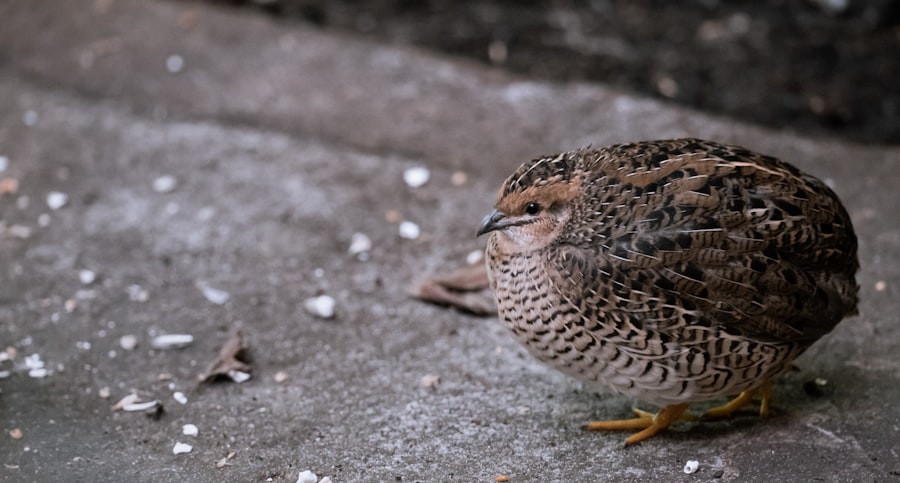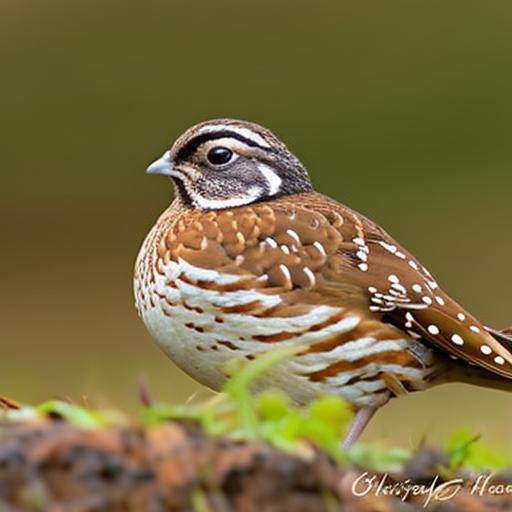When it comes to selecting the right quail breed for your farm or backyard, there are several factors to consider. First and foremost, you’ll want to think about the purpose of raising quail. If you’re primarily interested in egg production, you may want to consider breeds such as Coturnix (also known as Japanese) quail, which are known for their high egg production and relatively docile nature. On the other hand, if you’re interested in raising quail for meat, you may want to consider breeds such as the Jumbo Coturnix or the Bobwhite quail, which are known for their larger size and meat quality.
Another important factor to consider when selecting a quail breed is the climate and environment in which you’ll be raising them. Some quail breeds are more cold-hardy, while others are better suited to warmer climates. Additionally, some breeds may be better suited to free-range environments, while others may do better in confinement. It’s important to research the specific needs and characteristics of each breed to ensure that you select the right one for your specific circumstances.
Key Takeaways
- Select a quail breed that suits your needs, whether it’s for meat, eggs, or ornamental purposes.
- Provide a spacious and secure enclosure for your quail, with proper ventilation and protection from predators.
- Feed your quail a balanced diet of commercial feed, greens, and protein sources to ensure optimal health and egg production.
- Collect eggs regularly to prevent them from being damaged or eaten, and provide clean nesting areas for your quail.
- Monitor your quail for signs of illness, practice good hygiene, and consider vaccination to prevent common diseases.
Housing and Enclosure Requirements
Once you’ve selected the right quail breed for your needs, it’s important to provide them with the proper housing and enclosure. Quail can be raised in a variety of housing systems, including cages, pens, or aviaries. Regardless of the type of housing you choose, it’s important to provide enough space for the quail to move around comfortably and engage in natural behaviors such as dust bathing and foraging.
In addition to providing adequate space, it’s important to ensure that the housing and enclosure provide protection from predators and the elements. This may include using wire mesh to prevent access from predators such as raccoons or birds of prey, as well as providing shelter from wind, rain, and extreme temperatures. It’s also important to provide proper ventilation to prevent the buildup of ammonia and other harmful gases.
Feeding and Nutrition for Quail
Proper feeding and nutrition are essential for the health and productivity of quail. Quail require a balanced diet that includes a high-quality commercial feed specifically formulated for game birds. This feed should contain the necessary vitamins, minerals, and protein to support growth, egg production, and overall health.
In addition to commercial feed, quail can also benefit from supplemental treats such as mealworms, fruits, and vegetables. It’s important to provide these treats in moderation to prevent nutritional imbalances. Additionally, it’s important to provide access to clean, fresh water at all times, as quail can quickly become dehydrated.
Egg Production and Collection
If you’re raising quail for egg production, it’s important to provide the proper conditions to support high egg production. This includes providing a consistent light cycle of 14-16 hours of light per day, which can be achieved using artificial lighting in the coop or enclosure. It’s also important to provide nesting boxes filled with clean bedding material to encourage the quail to lay their eggs in a designated area.
When it comes to collecting quail eggs, it’s important to check the nesting boxes at least once a day to ensure that eggs are collected promptly. This not only helps prevent the eggs from being damaged or soiled but also encourages the quail to continue laying consistently. It’s also important to handle the eggs carefully to prevent breakage and store them properly in a cool, dry place.
Health and Disease Prevention
Maintaining the health of your quail is essential for their overall well-being and productivity. This includes providing a clean and sanitary environment, regular monitoring for signs of illness or disease, and prompt treatment when necessary. It’s also important to practice good biosecurity measures to prevent the introduction and spread of diseases within your quail flock.
In addition to good management practices, it’s important to work with a veterinarian who is knowledgeable about quail health and can provide guidance on preventative care and treatment options. This may include vaccinations, parasite control, and regular health checks to ensure that your quail remain healthy and productive.
Breeding and Incubation

If you’re interested in breeding quail, it’s important to understand the basics of quail reproduction and incubation. Quail reach sexual maturity at around 6-8 weeks of age, at which point they can begin mating and laying eggs. It’s important to provide a balanced ratio of males to females to prevent aggression and ensure successful breeding.
Once the eggs are laid, they can be collected and placed in an incubator set at the appropriate temperature and humidity for quail eggs. The incubation period for quail eggs is approximately 17-18 days, after which the chicks will hatch. It’s important to provide proper care and nutrition for the chicks once they hatch to ensure their health and growth.
Tips for Maximizing Egg Production
If you’re focused on maximizing egg production from your quail flock, there are several tips and strategies that can help you achieve this goal. Providing a high-quality diet that meets the nutritional needs of your quail is essential for supporting consistent egg production. Additionally, ensuring that your quail have access to a consistent light cycle of 14-16 hours per day can help stimulate egg production.
It’s also important to monitor the health of your quail regularly and address any issues promptly to prevent disruptions in egg production. Providing a clean and comfortable environment with proper ventilation and protection from predators can also help reduce stress on your quail and support their overall productivity.
In conclusion, raising quail can be a rewarding endeavor, whether you’re interested in egg production, meat production, or simply enjoying these unique birds as pets. By selecting the right breed, providing proper housing and nutrition, and implementing good management practices, you can create a thriving quail flock that provides you with fresh eggs or meat while also bringing enjoyment and satisfaction.
If you’re interested in keeping quail for eggs, you might also want to check out this informative article on the best chicken coop portage options at PoultryWizard. Having a suitable coop is essential for providing a safe and comfortable environment for your quail or chickens, and this article offers valuable insights into choosing the right coop for your needs.
FAQs
What are the benefits of keeping quail for eggs?
Quail eggs are considered a delicacy and are known for their rich flavor and high nutritional value. Quail are also smaller and easier to manage than chickens, making them a great option for those with limited space.
What do quail need in their living environment?
Quail need a secure and predator-proof enclosure with access to fresh water, a balanced diet, and protection from extreme weather conditions. They also require nesting boxes for laying eggs.
What do quail eat?
Quail are omnivores and eat a diet that consists of commercial quail feed, seeds, grains, insects, and green leafy vegetables. It’s important to provide them with a balanced diet to ensure they lay high-quality eggs.
How many eggs can I expect from a quail?
Quail are prolific layers and can lay up to 300 eggs per year, depending on the breed and environmental conditions. They typically start laying eggs at around 6-8 weeks of age.
Are quail eggs different from chicken eggs?
Quail eggs are smaller than chicken eggs and have a higher yolk to white ratio. They are also known for their delicate flavor and nutritional benefits, including being rich in protein and vitamins.
Are there any health concerns associated with keeping quail for eggs?
As with any poultry, it’s important to practice good hygiene and sanitation to prevent the spread of diseases. It’s also important to handle and cook quail eggs properly to reduce the risk of foodborne illnesses.
Meet Walter, the feathered-friend fanatic of Florida! Nestled in the sunshine state, Walter struts through life with his feathered companions, clucking his way to happiness. With a coop that’s fancier than a five-star hotel, he’s the Don Juan of the chicken world. When he’s not teaching his hens to do the cha-cha, you’ll find him in a heated debate with his prized rooster, Sir Clucks-a-Lot. Walter’s poultry passion is no yolk; he’s the sunny-side-up guy you never knew you needed in your flock of friends!







